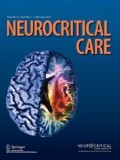Background
We
conducted a preliminary phase I, dose-escalating, safety, and
tolerability trial in the population of patients with acute
intracerebral hemorrhage (ICH) by using human allogeneic bone
marrow–derived mesenchymal stem/stromal cells.
Methods
Eligibility
criteria included nontraumatic supratentorial hematoma less than 60 mL
and Glasgow Coma Scale score greater than 5. All patients were monitored
in the neurosciences intensive care unit for safety and tolerability of
mesenchymal stem/stromal cell infusion and adverse events. We also
explored the use of cytokines as biomarkers to assess responsiveness to
the cell therapy. We screened 140 patients, enrolling 9 who met
eligibility criteria into three dose groups: 0.5 million cells/kg, 1
million cells/kg, and 2 million cells/kg.
Results
Intravenous
administration of allogeneic bone marrow–derived mesenchymal
stem/stromal cells to treat patients with acute ICH is feasible and
safe.
Conclusions
Future
larger randomized, placebo-controlled ICH studies are necessary to
validate this study and establish the effectiveness of this therapeutic
approach in the treatment of patients with ICH.

No comments:
Post a Comment